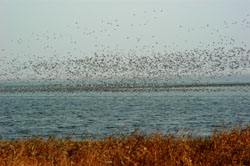
A group of CAS scientists have come up with suggestions about the wetland protection after a two-week investigation in the middle and lower reaches of the Yangtzte River from Dec. 2 to 14.
Based on the observation and comprehensive analysis, the scientists suggested that the statutes and regulations in enactment concerning wetland protection be introduced or further perfected while the infrastructure at various natural reserves has to be promoted. Wetland resources have to be undergoing regular appraisals and subject to a permanent system of ceaseless monitoring. The rational plans and schemes must be working out in the context of the development of the water resources. They call for more efforts to be injected in the exploration of dynamic changes in wetland ecosystems and their bio-diversity while nearby neighborhoods are encouraged to take part in the move of wetland protection.
The survey, which was led by Prof. Deng Wei and Prof. Lu Xianguo from the CAS Institute of Geography and Agricultural Ecology, covered major wetlands of the reaches, including the Honghu Lake in Hubei Province, Poyang Lake in Jiangxi Province, Xixi Creek in suburban Hangzhou City, artificial wetland for wastewater treatment, the coastal wetland in the prefecture of Yancheng of Jiangsu Province and the wetlands surrounding the Taihu Lake. The investigation enables the scientists to get a deeper understanding of the natural conditions of the wetlands.
The wetland resources in the middle and lower reaches of the Yangtze mainstream are lake wetlands, noted for their unique ecotypes and structures, superb climatic settings and geographic locations. Many of them are flourishing habitats of water fowls or stopovers on their migratory routes, playing an irreplaceable role in the protection of the native bio-diversity.
However, the researchers have discovered serious problems affecting the sustainable development of wetlands. One is the mounting threat posed by the economic development in the region. At present, wetlands are shrinking in areas because of the exploitation of land resources by farmland reclamation and expansion of the urban reconstruction. In addition, the over-fishing practice leads to the decrease in bio-diversity and ecological imbalance.
The second is the decline in water resources. The construction spree of water conservancy projects imposes barriers between the different fluvio-lacustrine systems so that the water resources are decreasing in the majority of the wetlands, impeding their effects in ecological purification and environment cleansing functions.
The third is the water quality deterioration. Subject to industrial, agricultural and urban pollution, the water quality of the wetlands sees an ominous tendency from bad to worse.
The fourth is the bio-invasion. The encroachment of alien species such as the water hyacinth (Eichhornia crassipes) and cordgrasses (
Spartina spp) now becomes more and more menacing to the healthy performance of a wetland ecosystem.





